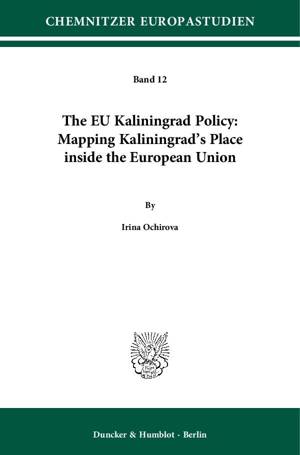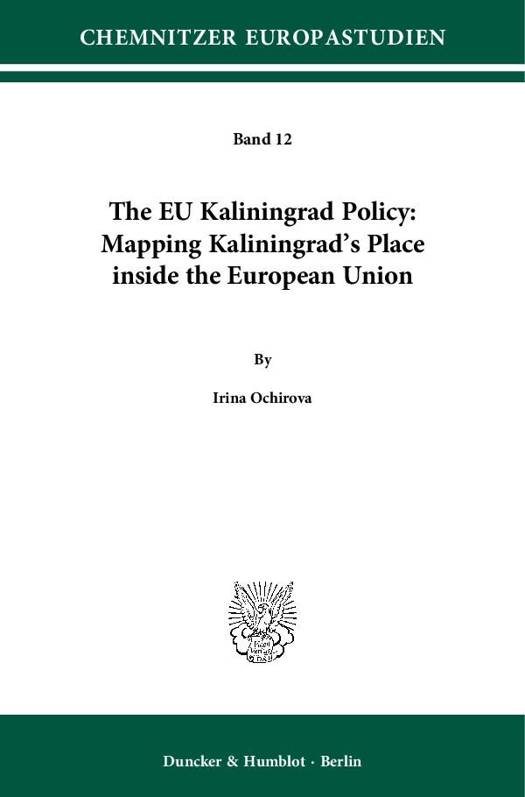
- Afhalen na 1 uur in een winkel met voorraad
- Gratis thuislevering in België vanaf € 30
- Ruim aanbod met 7 miljoen producten
- Afhalen na 1 uur in een winkel met voorraad
- Gratis thuislevering in België vanaf € 30
- Ruim aanbod met 7 miljoen producten
Zoeken
€ 245,95
+ 491 punten
Omschrijving
The Kaliningrad Oblast is a subject of the Russian Federation which became an EU's enclave upon its Eastern enlargement of 2004. This inquiry examines the intricate position of the Kaliningrad region inside the European Union from a legal and institutional rather than geopolitical perspective. Challenging conventional notions about inclusion of third units into the EU and attempting to bridge a gap in the academic literature on the EU's policy towards Kaliningrad, the paper tests the hypothesis that the Kaliningrad Oblast is to a certain extent included or integrated into the EU. More particularly, while spelling out and assessing the EU's Kaliningrad policy it seeks to answer the main research question as to whether this policy can be qualified as essentially a policy of inclusion.
The inquiry proceeds from manifold assumptions of the "insides" and "outsides" of the EU, the growing flexibility of models of integration into the Union as well as the notions of the EU's borders including geopolitical, institutional/legal, transactional and cultural borders which consistently become fuzzier. A substantial part of the paper rests on the study of the bilateral political, legal and institutional relationship between the EU and Russia. Furthermore, the paper scrutinizes the oblast's legal capacity in international relations, as well as its status of Special Economic Zone in the framework of Russian federal policy. It eventually traces and systematizes the EU's activities in its eastern enclave. Although the analysis of the policy by the EU directed towards Kaliningrad does not allow calling it a clear policy of inclusion it still dismisses the idea of the EU treating Kaliningrad as a clear outsider.
The inquiry proceeds from manifold assumptions of the "insides" and "outsides" of the EU, the growing flexibility of models of integration into the Union as well as the notions of the EU's borders including geopolitical, institutional/legal, transactional and cultural borders which consistently become fuzzier. A substantial part of the paper rests on the study of the bilateral political, legal and institutional relationship between the EU and Russia. Furthermore, the paper scrutinizes the oblast's legal capacity in international relations, as well as its status of Special Economic Zone in the framework of Russian federal policy. It eventually traces and systematizes the EU's activities in its eastern enclave. Although the analysis of the policy by the EU directed towards Kaliningrad does not allow calling it a clear policy of inclusion it still dismisses the idea of the EU treating Kaliningrad as a clear outsider.
Specificaties
Betrokkenen
- Auteur(s):
- Uitgeverij:
Inhoud
- Aantal bladzijden:
- 400
- Taal:
- Engels
- Reeks:
- Reeksnummer:
- nr. 12
Eigenschappen
- Productcode (EAN):
- 9783428134137
- Verschijningsdatum:
- 5/04/2011
- Uitvoering:
- Paperback
- Formaat:
- Trade paperback (VS)
- Afmetingen:
- 155 mm x 231 mm
- Gewicht:
- 5347 g

Alleen bij Standaard Boekhandel
+ 491 punten op je klantenkaart van Standaard Boekhandel
Beoordelingen
We publiceren alleen reviews die voldoen aan de voorwaarden voor reviews. Bekijk onze voorwaarden voor reviews.








